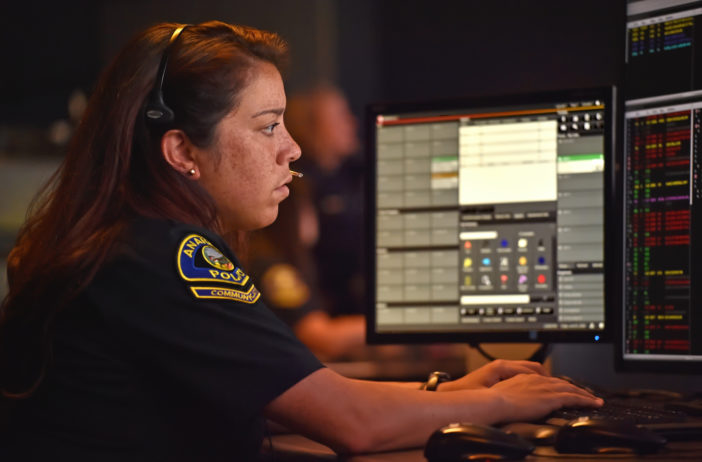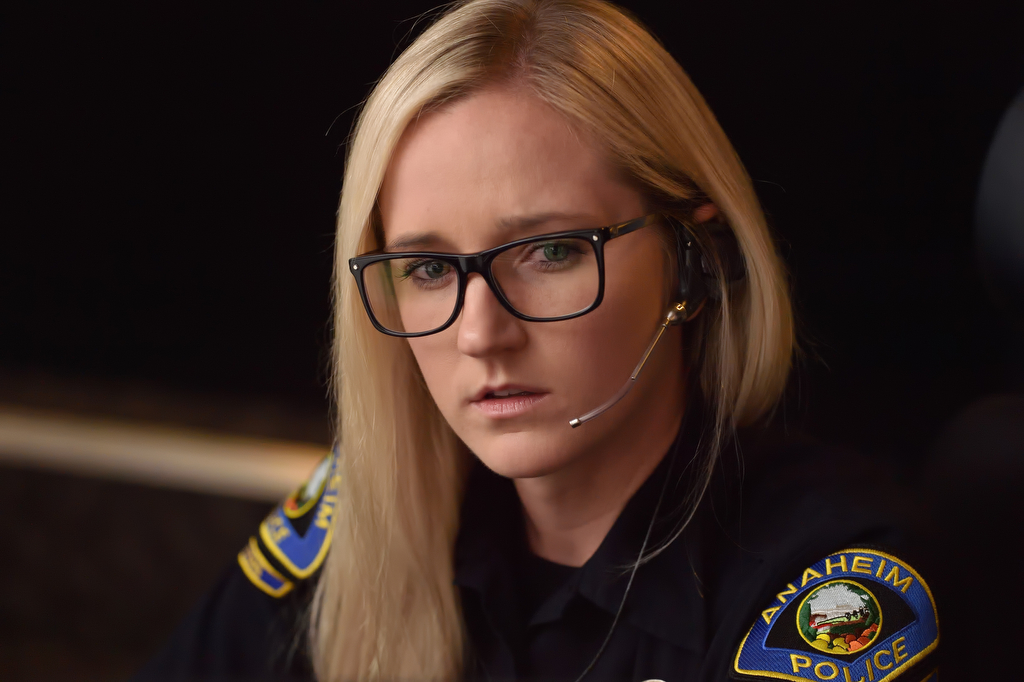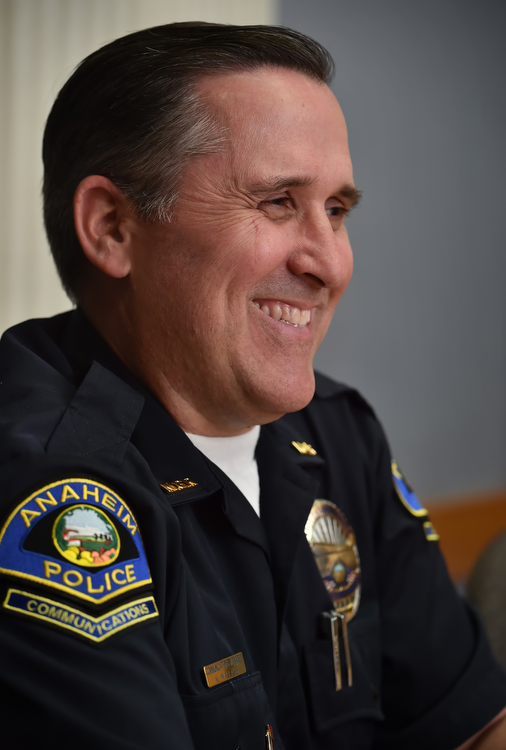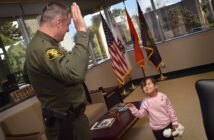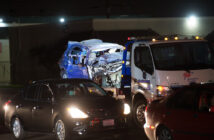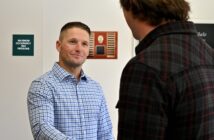Anaheim’s police dispatchers sit facing a large window, multiple computer monitors stacked so they can see everything happening in the city at a glance.
The three rows face the same direction, and dispatchers use their trained ear to keep tabs on everything happening behind and in front of them so they can jump in to help when needed.
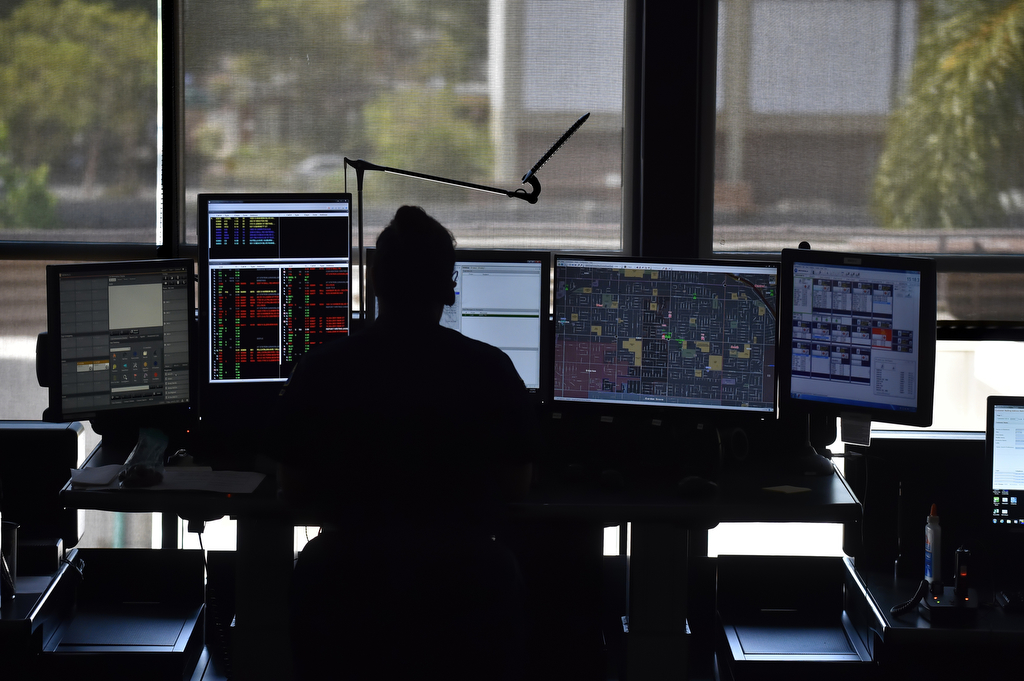
Like a window to the outside world, an Anaheim police dispatcher sits in front of multiple computer screens designed to give her the information she needs at her fingertips.
Photo by Steven Georges/Behind the Badge OC
“As a dispatcher, you develop skills like multi-tasking and split-ear listening (listening to multiple conversations at once), ” said Communications Manager Kurt Wallace, who’s been in dispatch at the Anaheim Police Department for 22 years.
The primary and secondary radio dispatchers sit in front, with phone dispatchers in the center and supervisors in back. Two front row stations are empty, ready for action during a major incident.
Anaheim Police Department’s dispatchers process 400 to 500 911 calls per day, and about 800 to 1,000 business calls per day, Wallace said.
Their goal?
Answering 95 percent of the calls in 15 seconds or less.
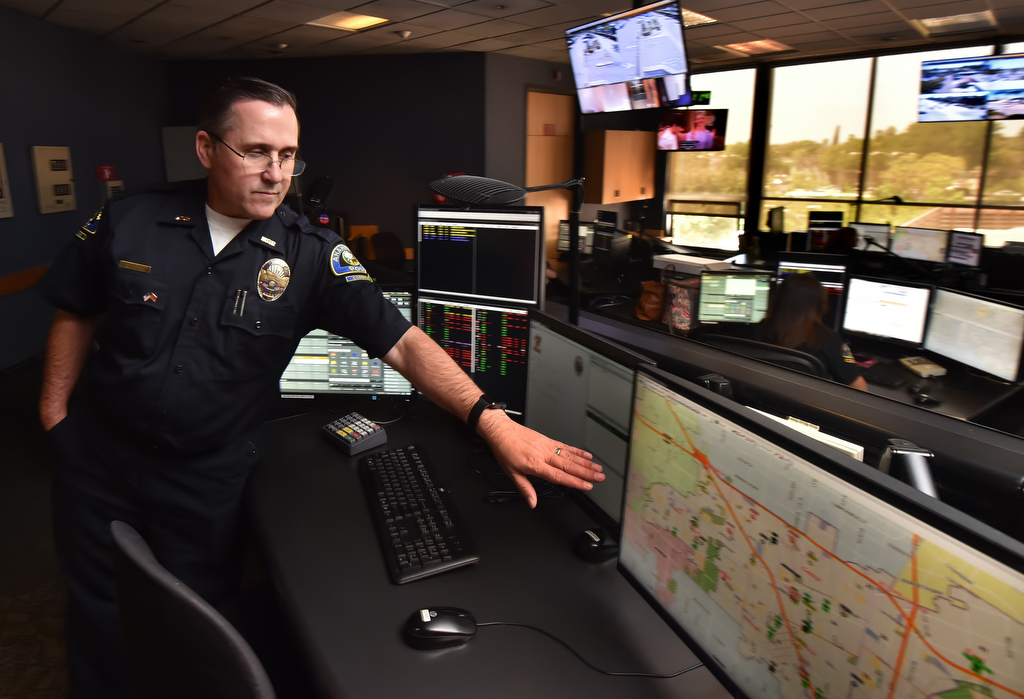
Anaheim Police Communications Manager Kurt Wallace explains what each screen is used for at a police dispatcher station.
Photo by Steven Georges/Behind the Badge OC
“Usually the hardest part is when you’re up here on the radio on the hot seat …because that is where you have to be very reactive,” Wallace said. “You have to make good decisions. You have to make split-second decisions…there’s a lot of responsibility with that position.”
Each station has five screens, plus a television showing police department surveillance feeds. In addition to monitoring incoming calls, dispatchers also track officer locations by GPS so they know who is closest to send to a call.
Division Commander Shelley McKerren, who, over the last 40 years has worked as a dispatcher, supervisor, manager, and now as a Division Commander , has watched the dispatch profession evolve from using a manual typewriter, paper records, and a couple radio channels to today’s computer databases and 81 countywide radio frequencies.
“The premise is still the same in that you get the right information, you listen to what the person is saying, and you give them options,” McKerren said.
Only about 60 percent of the people who apply for the job make it through the interview process and the year-long training to become a dispatcher, Wallace said.
Dispatchers first have to take a Commission on Peace Officer Standards and Training (POST) exam, which is about three hours long and measures skills dispatchers need, such as multitasking, split-ear listening, active listening, and being able to transition quickly, he said.
“It’s definitely a good job,” said Dispatcher Crystal Paqua, who’s spent 14 years at the Anaheim Police Department. “Not everybody can do this job well.”
Throughout the day, dispatchers go from taking routine questions to helping a parent when their baby stopped breathing or sending help to someone who’s been robbed or shot, and then back to routine questions. They have to keep a calm demeanor no matter what the situation.
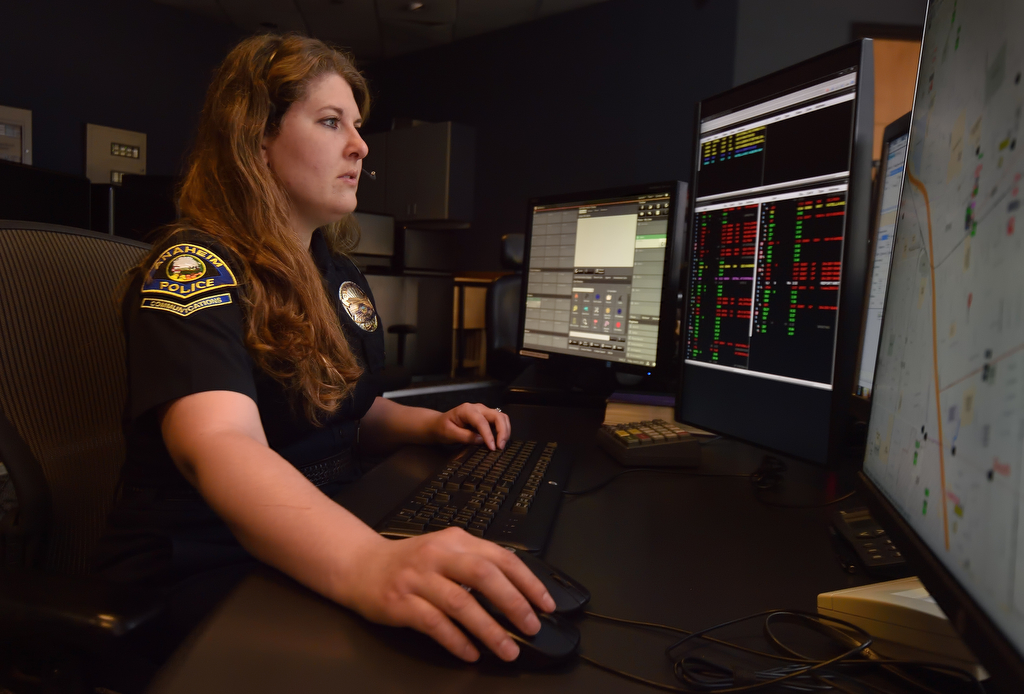
Anaheim Police Dispatcher Heather Champlin collects information from a 911 caller so that officers will have those details when they respond.
Photo by Steven Georges/Behind the Badge OC
“You’re constantly shifting gears,” Wallace said. “You’re on the phone for about 90 seconds on average with the callers,you’re gathering a lot of information, you’re triaging the call, you’re entering the call for service, you’re typing as quick as you can… you have these emotional highs and lows.”
That adrenaline, coupled with a feeling of unfinished business when dispatchers aren’t always able to find out how the call ended for the officers and the people involved, can be difficult to shake at the end of the day, but dispatchers try to leave the stresses of the job behind when they hang up their headset at the end of their shift, Dispatcher Jill Helms said.
“You really get a good feeling from helping people,” Helms said. “At the end of the day, you made a difference.”
“It’s not a boring job for sure,” Dispatcher Nylene Fagaly added.
Today’s dispatchers have some advice for those calling the police. First, save the 911 calls for true, life-threatening emergencies such as an assault or crime in progress. Instead, keep your local police department’s nonemergency line handy.
“Losing your cell phone is not an emergency call,” Wallace said. “Keep the emergency line open for officers or others when they need it.”
Second, know your location, or at the very least, your cross streets. A majority of people call from their mobile phones, but police don’t automatically see the location unless the call is coming from a land line – instead, they see the cell tower the phone is using, which is not as accurate.
And finally, listen to the dispatcher and answer questions in the order they ask them. For example, if a robbery just occurred and the robber left in a car, the dispatcher will need a description of the car before the description of the robber so they can send that information to patrol cars in the area, increasing the chance that officers find the car.
Oh, and one final tip – be realistic.
“It’s not like TV,” said Dispatcher Rick Johnson, who’s been with the Anaheim Police Department for 11 years.
One woman, he said, wanted the department to run facial recognition on someone who had bumped into her while she was walking near an amusement park.
“We don’t have all this magic stuff,” Johnson said.
Read more:
Dispatchers take heat as the ‘first first responders,’ so this week, show them some love
Longtime Anaheim resident makes the grade in highly competitive job of police dispatcher
Why this police dispatcher took his last call, and what he’s now doing to help others in field
 Behind the Badge
Behind the Badge
